18 September 2013 (Gothic Theatre, Denver CO)
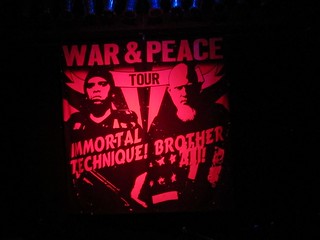 The great thing about a classic hip hop show is that it's non-stop. There are no breaks where the audience has to talk among themselves waiting for the next act. This keeps the energy constant, but it requires a pretty large crew of entertainers and pacing is important. The War & Peace Tour, featuring Immortal Technique and Brother Ali was a nicely executed example. Not only did the headliners have different styles, but the lineup was split between their hometowns. Brother Ali had a fellow Minneapolis act, I Self Devine, on the bill, while the rest of the performers represented New York. This personality split helped keep the evening interesting.
The great thing about a classic hip hop show is that it's non-stop. There are no breaks where the audience has to talk among themselves waiting for the next act. This keeps the energy constant, but it requires a pretty large crew of entertainers and pacing is important. The War & Peace Tour, featuring Immortal Technique and Brother Ali was a nicely executed example. Not only did the headliners have different styles, but the lineup was split between their hometowns. Brother Ali had a fellow Minneapolis act, I Self Devine, on the bill, while the rest of the performers represented New York. This personality split helped keep the evening interesting.
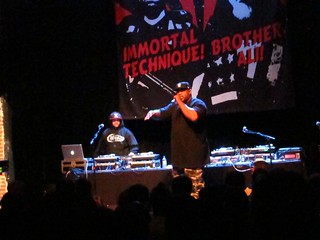 Brooklyn rapper, Poison Pen, played the host for the evening. After a brief bit of interaction, he brought the first act, J. Arch, to the stage. His set was fairly short, but he made a good impression. His preferred delivery was to let the syllables roll in waves. He was a big man, but he had a good sense of humor. After joking that he could pass for security, his punchline was to reveal his marijuana print t-shirt. Of course, that means a lot less now in Colorado than it used to.
Brooklyn rapper, Poison Pen, played the host for the evening. After a brief bit of interaction, he brought the first act, J. Arch, to the stage. His set was fairly short, but he made a good impression. His preferred delivery was to let the syllables roll in waves. He was a big man, but he had a good sense of humor. After joking that he could pass for security, his punchline was to reveal his marijuana print t-shirt. Of course, that means a lot less now in Colorado than it used to.
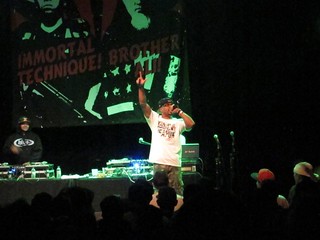 Following J. Arch, Hasan Salaam took the stage. I hadn't heard him before, but he impressed with some wicked, rapid-fire spitting. No one-trick pony, he did a good job of breaking up the pace by occasionally dropping back and preaching in a Michael Franti style slowdown. He laid down a steady stream of conscious lyrics. One of the stand outs, ".1911" was from his 2011 album, Music Is My Weapon. It featured old school references, name checking Malcolm X and Bobby Seale. But more impressively, Salaam dug deeper, comparing the message of his song to the anti-slavery incitement of David Walker's An Appeal to the Coloured Citizens of the World.
Following J. Arch, Hasan Salaam took the stage. I hadn't heard him before, but he impressed with some wicked, rapid-fire spitting. No one-trick pony, he did a good job of breaking up the pace by occasionally dropping back and preaching in a Michael Franti style slowdown. He laid down a steady stream of conscious lyrics. One of the stand outs, ".1911" was from his 2011 album, Music Is My Weapon. It featured old school references, name checking Malcolm X and Bobby Seale. But more impressively, Salaam dug deeper, comparing the message of his song to the anti-slavery incitement of David Walker's An Appeal to the Coloured Citizens of the World.
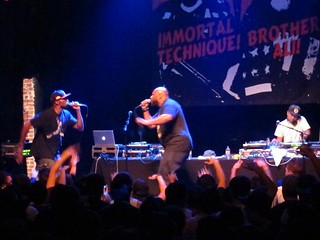 The balance shifted from the East Coast to the Midwest when I Self Devine (Chaka Mkali) stepped up. He had a partner with him whose name I never caught, which is a shame because his emphasis gave I Self Devine's lines an extra zing. The lead off song was an acapella rap that laid out his personal story. The two performers created a strong presence as they often turning face-to-face and locked into a long series of twinned lyrics. I Self Devine also set up a good contrast between his hard-edged delivery and the sweet R&B backing grooves. It was a long set, which gave us plenty of time to appreciate I Self Devine's smooth personal patter as he shared a lot of his personality.
The balance shifted from the East Coast to the Midwest when I Self Devine (Chaka Mkali) stepped up. He had a partner with him whose name I never caught, which is a shame because his emphasis gave I Self Devine's lines an extra zing. The lead off song was an acapella rap that laid out his personal story. The two performers created a strong presence as they often turning face-to-face and locked into a long series of twinned lyrics. I Self Devine also set up a good contrast between his hard-edged delivery and the sweet R&B backing grooves. It was a long set, which gave us plenty of time to appreciate I Self Devine's smooth personal patter as he shared a lot of his personality.
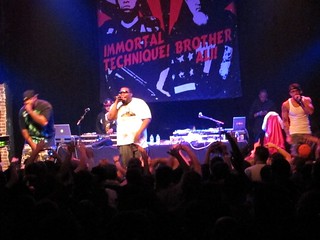 Finally, our host, Poison Pen came out and showed off his own solid style. His flow had a strong change-up rhythm that broke up the lines. After inviting local rapper Black Pegasus to take the stage for an acapella, he brought out Hasan Salaam and J. Arch to back him. The stage dynamic and shifting support gave his set an old-school feel.
Finally, our host, Poison Pen came out and showed off his own solid style. His flow had a strong change-up rhythm that broke up the lines. After inviting local rapper Black Pegasus to take the stage for an acapella, he brought out Hasan Salaam and J. Arch to back him. The stage dynamic and shifting support gave his set an old-school feel.
It's worth mentioning the DJs at this point. Two different guys provided the beats for the full show, DJ G.I. Joe and DJ Todda. Each did a good job of adapting to the feel of the individual rappers and hyping the crowd.
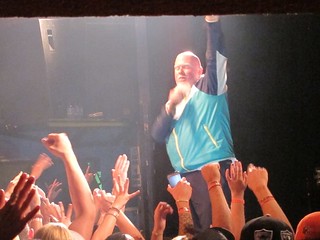
The energy amped up when Brother Ali came out. He was incredibly charismatic, effortlessly working the crowd and creating a low-key physical demeanor offset by a seriously intense presence. His set bridged from his personal character and history to the over-arching messages that he built up. This was called the War & Peace Tour and Brother Ali started out working the war angle. Songs like "Truth Is" brought the theme of control and resistance, but he could still touch on personal moments within that context. So, a story about how he and Immortal Technique first toured together at the start of Brother Ali's career developed into first a riff on the music industry and then a full on diatribe.
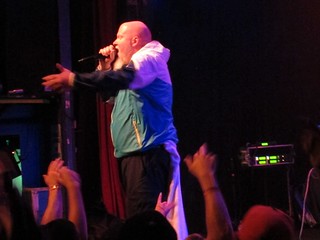 "Mourning In America" from last year's release proved to be a powerful set-piece for Ali's skills. Earnest and serious, his flow was relentless, the progression of lines rolling out like an inevitable tide. He also performed his controversial "Uncle Sam Goddamn" and tossed off some timely improvised lines about Syria into the anti-Government screed. This socio-political theme became a callback for much of the set. A little later, he asserted, "You cannot love hip hop if you do not love the people who created it." This spawned a lecture on white privilege and race issues, but Ali was preaching to the choir. Still, it led smoothly into the next song.
"Mourning In America" from last year's release proved to be a powerful set-piece for Ali's skills. Earnest and serious, his flow was relentless, the progression of lines rolling out like an inevitable tide. He also performed his controversial "Uncle Sam Goddamn" and tossed off some timely improvised lines about Syria into the anti-Government screed. This socio-political theme became a callback for much of the set. A little later, he asserted, "You cannot love hip hop if you do not love the people who created it." This spawned a lecture on white privilege and race issues, but Ali was preaching to the choir. Still, it led smoothly into the next song.
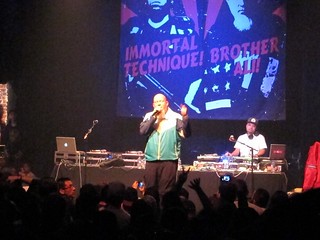 This easy progression in the setlist was a constant indication of how well-planned Brother Ali's show was. He maintained a deliberate pace and hit all his marks, but it never felt lifeless or rote. Disruptions happened, but didn't derail the set. During an acapella of "Stop the Press", Ali took a more conversational tone than the album version, which turned it into an confessional sharing about the challenges in his life, including his father's suicide. A guy up front was breaking the mood, but Ali deftly handled him. It wasn't a heckle, but it required some crowd work and Brother Ali kept the emphasis positive as he took back his moment.
This easy progression in the setlist was a constant indication of how well-planned Brother Ali's show was. He maintained a deliberate pace and hit all his marks, but it never felt lifeless or rote. Disruptions happened, but didn't derail the set. During an acapella of "Stop the Press", Ali took a more conversational tone than the album version, which turned it into an confessional sharing about the challenges in his life, including his father's suicide. A guy up front was breaking the mood, but Ali deftly handled him. It wasn't a heckle, but it required some crowd work and Brother Ali kept the emphasis positive as he took back his moment.
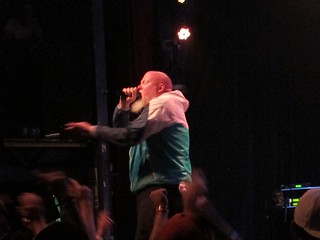 After hitting on a couple of relationship raps and mentioning his crazy ex-wife, he shouted out to the ReMINDers, a Denver rap act, before laying down a soulful version of "You Say (Puppy Love)". Then, he made a sharp, overt shift to take the show into a party mood. This was an effective transition, moving from war to cover the peace side. The positive tip wrapped up on his song, "Forrest Whitaker". While he sang the chorus: "I'ma be all right/ You ain't gotta be my friend tonight," the crowd tagged it on command. "You ain't gotta love me!" But, of course we did.
After hitting on a couple of relationship raps and mentioning his crazy ex-wife, he shouted out to the ReMINDers, a Denver rap act, before laying down a soulful version of "You Say (Puppy Love)". Then, he made a sharp, overt shift to take the show into a party mood. This was an effective transition, moving from war to cover the peace side. The positive tip wrapped up on his song, "Forrest Whitaker". While he sang the chorus: "I'ma be all right/ You ain't gotta be my friend tonight," the crowd tagged it on command. "You ain't gotta love me!" But, of course we did.
 If Brother Ali made even the political seem personal, Immortal Technique was a demagogue, alternately preaching, ranting, and inciting. His New York crew, Poison Pen, Hasan Salaam, and J. Arch, came out to support him, filling the stage. This created a busier, livelier set that emphasized the differences between the two artists. Each man had a focused aura of intensity, strong vocal skills, and sharp lyrics that covered the same messages of an unrepresentative government, historical injustice, corporate greed, and a vampiric music industry. But Brother Ali's grounded confidence contrasted sharply with Immortal Technique's fiery righteousness.
If Brother Ali made even the political seem personal, Immortal Technique was a demagogue, alternately preaching, ranting, and inciting. His New York crew, Poison Pen, Hasan Salaam, and J. Arch, came out to support him, filling the stage. This created a busier, livelier set that emphasized the differences between the two artists. Each man had a focused aura of intensity, strong vocal skills, and sharp lyrics that covered the same messages of an unrepresentative government, historical injustice, corporate greed, and a vampiric music industry. But Brother Ali's grounded confidence contrasted sharply with Immortal Technique's fiery righteousness.
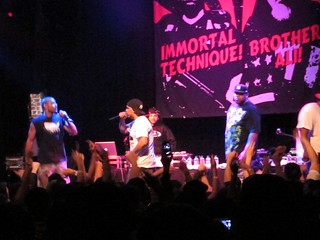 The constant motion onstage and Immortal Technique's confrontational style pushed the energy in the hall to new heights. Where Brother Ali, held the audience rapt, Immortal Technique goaded the crowd to form a mosh pit and fed off their zeal. His flow complemented this; he tended to alternate slower lines and faster riffs, letting him build up his raps into a powerful drive. At times, his delivery was belligerent, packed with attitude and personality, but it fit his sharply turned words.
The constant motion onstage and Immortal Technique's confrontational style pushed the energy in the hall to new heights. Where Brother Ali, held the audience rapt, Immortal Technique goaded the crowd to form a mosh pit and fed off their zeal. His flow complemented this; he tended to alternate slower lines and faster riffs, letting him build up his raps into a powerful drive. At times, his delivery was belligerent, packed with attitude and personality, but it fit his sharply turned words.
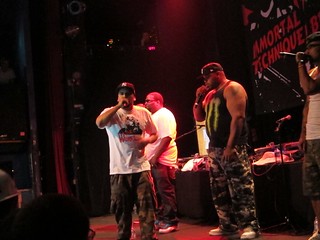 His patter had a loose feel, even if he was leading to a particular point. A great example started as a comparison between rap and culture. "Hat, cat, rat, fat... that's rap" Rather than mere rhyming, he asserted that culture is about who you are. He worked this theme, rising in intensity before declaring, "Hip hop started with a motherfucking DJ," cuing DJ G.I. Joe to kick loose with a phenomenal demonstration of turntable skills. He started simple, just working up a scratched beat with flare and transform accents. Then he graduated into some impressive beat juggling before upping the ante with a crazy set of stage moves. 360 degree spins, over the shoulder scratches, and cross handed manipulation -- DJ G.I. Joe made it look easy and never skipped a beat.
His patter had a loose feel, even if he was leading to a particular point. A great example started as a comparison between rap and culture. "Hat, cat, rat, fat... that's rap" Rather than mere rhyming, he asserted that culture is about who you are. He worked this theme, rising in intensity before declaring, "Hip hop started with a motherfucking DJ," cuing DJ G.I. Joe to kick loose with a phenomenal demonstration of turntable skills. He started simple, just working up a scratched beat with flare and transform accents. Then he graduated into some impressive beat juggling before upping the ante with a crazy set of stage moves. 360 degree spins, over the shoulder scratches, and cross handed manipulation -- DJ G.I. Joe made it look easy and never skipped a beat.
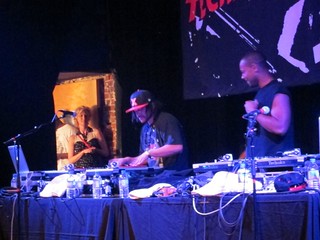
This break served as a palate cleanser, readying the audience for more of Immortal Technique's raps. Once again, his setups were strong. His introduction for "Freedom of Speech" started out with him taking credit for breaking the NSA invasion of privacy scandal years ago. He built this into a rhetorical question about how could he still be alive if he's such a threat to the government? The sample of Pinocchio singing "I've Got No Strings" served as his answer as he rolled into the song, which excoriates the music biz and challenges the powers that be.
 The strongest song in his show was "Dance with the Devil", which drops into a dark well of rape, murder, and suicide. It was a hard, ugly moment, but he used it like a boot camp for the crowd. He tore us open and drained us in order to rebuild us and sell the positive aspect of his message. Throughout the night, his raps fell somewhere between a sermon and rage against an unjust society, but he kept redirecting that into admonitions to act morally, to step up and protect the weak, and to stand for right.
The strongest song in his show was "Dance with the Devil", which drops into a dark well of rape, murder, and suicide. It was a hard, ugly moment, but he used it like a boot camp for the crowd. He tore us open and drained us in order to rebuild us and sell the positive aspect of his message. Throughout the night, his raps fell somewhere between a sermon and rage against an unjust society, but he kept redirecting that into admonitions to act morally, to step up and protect the weak, and to stand for right.
More photos on my Flickr
 The great thing about a classic hip hop show is that it's non-stop. There are no breaks where the audience has to talk among themselves waiting for the next act. This keeps the energy constant, but it requires a pretty large crew of entertainers and pacing is important. The War & Peace Tour, featuring Immortal Technique and Brother Ali was a nicely executed example. Not only did the headliners have different styles, but the lineup was split between their hometowns. Brother Ali had a fellow Minneapolis act, I Self Devine, on the bill, while the rest of the performers represented New York. This personality split helped keep the evening interesting.
The great thing about a classic hip hop show is that it's non-stop. There are no breaks where the audience has to talk among themselves waiting for the next act. This keeps the energy constant, but it requires a pretty large crew of entertainers and pacing is important. The War & Peace Tour, featuring Immortal Technique and Brother Ali was a nicely executed example. Not only did the headliners have different styles, but the lineup was split between their hometowns. Brother Ali had a fellow Minneapolis act, I Self Devine, on the bill, while the rest of the performers represented New York. This personality split helped keep the evening interesting.
Opening acts
 Brooklyn rapper, Poison Pen, played the host for the evening. After a brief bit of interaction, he brought the first act, J. Arch, to the stage. His set was fairly short, but he made a good impression. His preferred delivery was to let the syllables roll in waves. He was a big man, but he had a good sense of humor. After joking that he could pass for security, his punchline was to reveal his marijuana print t-shirt. Of course, that means a lot less now in Colorado than it used to.
Brooklyn rapper, Poison Pen, played the host for the evening. After a brief bit of interaction, he brought the first act, J. Arch, to the stage. His set was fairly short, but he made a good impression. His preferred delivery was to let the syllables roll in waves. He was a big man, but he had a good sense of humor. After joking that he could pass for security, his punchline was to reveal his marijuana print t-shirt. Of course, that means a lot less now in Colorado than it used to. Following J. Arch, Hasan Salaam took the stage. I hadn't heard him before, but he impressed with some wicked, rapid-fire spitting. No one-trick pony, he did a good job of breaking up the pace by occasionally dropping back and preaching in a Michael Franti style slowdown. He laid down a steady stream of conscious lyrics. One of the stand outs, ".1911" was from his 2011 album, Music Is My Weapon. It featured old school references, name checking Malcolm X and Bobby Seale. But more impressively, Salaam dug deeper, comparing the message of his song to the anti-slavery incitement of David Walker's An Appeal to the Coloured Citizens of the World.
Following J. Arch, Hasan Salaam took the stage. I hadn't heard him before, but he impressed with some wicked, rapid-fire spitting. No one-trick pony, he did a good job of breaking up the pace by occasionally dropping back and preaching in a Michael Franti style slowdown. He laid down a steady stream of conscious lyrics. One of the stand outs, ".1911" was from his 2011 album, Music Is My Weapon. It featured old school references, name checking Malcolm X and Bobby Seale. But more impressively, Salaam dug deeper, comparing the message of his song to the anti-slavery incitement of David Walker's An Appeal to the Coloured Citizens of the World. The balance shifted from the East Coast to the Midwest when I Self Devine (Chaka Mkali) stepped up. He had a partner with him whose name I never caught, which is a shame because his emphasis gave I Self Devine's lines an extra zing. The lead off song was an acapella rap that laid out his personal story. The two performers created a strong presence as they often turning face-to-face and locked into a long series of twinned lyrics. I Self Devine also set up a good contrast between his hard-edged delivery and the sweet R&B backing grooves. It was a long set, which gave us plenty of time to appreciate I Self Devine's smooth personal patter as he shared a lot of his personality.
The balance shifted from the East Coast to the Midwest when I Self Devine (Chaka Mkali) stepped up. He had a partner with him whose name I never caught, which is a shame because his emphasis gave I Self Devine's lines an extra zing. The lead off song was an acapella rap that laid out his personal story. The two performers created a strong presence as they often turning face-to-face and locked into a long series of twinned lyrics. I Self Devine also set up a good contrast between his hard-edged delivery and the sweet R&B backing grooves. It was a long set, which gave us plenty of time to appreciate I Self Devine's smooth personal patter as he shared a lot of his personality. Finally, our host, Poison Pen came out and showed off his own solid style. His flow had a strong change-up rhythm that broke up the lines. After inviting local rapper Black Pegasus to take the stage for an acapella, he brought out Hasan Salaam and J. Arch to back him. The stage dynamic and shifting support gave his set an old-school feel.
Finally, our host, Poison Pen came out and showed off his own solid style. His flow had a strong change-up rhythm that broke up the lines. After inviting local rapper Black Pegasus to take the stage for an acapella, he brought out Hasan Salaam and J. Arch to back him. The stage dynamic and shifting support gave his set an old-school feel.It's worth mentioning the DJs at this point. Two different guys provided the beats for the full show, DJ G.I. Joe and DJ Todda. Each did a good job of adapting to the feel of the individual rappers and hyping the crowd.

The energy amped up when Brother Ali came out. He was incredibly charismatic, effortlessly working the crowd and creating a low-key physical demeanor offset by a seriously intense presence. His set bridged from his personal character and history to the over-arching messages that he built up. This was called the War & Peace Tour and Brother Ali started out working the war angle. Songs like "Truth Is" brought the theme of control and resistance, but he could still touch on personal moments within that context. So, a story about how he and Immortal Technique first toured together at the start of Brother Ali's career developed into first a riff on the music industry and then a full on diatribe.
 "Mourning In America" from last year's release proved to be a powerful set-piece for Ali's skills. Earnest and serious, his flow was relentless, the progression of lines rolling out like an inevitable tide. He also performed his controversial "Uncle Sam Goddamn" and tossed off some timely improvised lines about Syria into the anti-Government screed. This socio-political theme became a callback for much of the set. A little later, he asserted, "You cannot love hip hop if you do not love the people who created it." This spawned a lecture on white privilege and race issues, but Ali was preaching to the choir. Still, it led smoothly into the next song.
"Mourning In America" from last year's release proved to be a powerful set-piece for Ali's skills. Earnest and serious, his flow was relentless, the progression of lines rolling out like an inevitable tide. He also performed his controversial "Uncle Sam Goddamn" and tossed off some timely improvised lines about Syria into the anti-Government screed. This socio-political theme became a callback for much of the set. A little later, he asserted, "You cannot love hip hop if you do not love the people who created it." This spawned a lecture on white privilege and race issues, but Ali was preaching to the choir. Still, it led smoothly into the next song. This easy progression in the setlist was a constant indication of how well-planned Brother Ali's show was. He maintained a deliberate pace and hit all his marks, but it never felt lifeless or rote. Disruptions happened, but didn't derail the set. During an acapella of "Stop the Press", Ali took a more conversational tone than the album version, which turned it into an confessional sharing about the challenges in his life, including his father's suicide. A guy up front was breaking the mood, but Ali deftly handled him. It wasn't a heckle, but it required some crowd work and Brother Ali kept the emphasis positive as he took back his moment.
This easy progression in the setlist was a constant indication of how well-planned Brother Ali's show was. He maintained a deliberate pace and hit all his marks, but it never felt lifeless or rote. Disruptions happened, but didn't derail the set. During an acapella of "Stop the Press", Ali took a more conversational tone than the album version, which turned it into an confessional sharing about the challenges in his life, including his father's suicide. A guy up front was breaking the mood, but Ali deftly handled him. It wasn't a heckle, but it required some crowd work and Brother Ali kept the emphasis positive as he took back his moment. After hitting on a couple of relationship raps and mentioning his crazy ex-wife, he shouted out to the ReMINDers, a Denver rap act, before laying down a soulful version of "You Say (Puppy Love)". Then, he made a sharp, overt shift to take the show into a party mood. This was an effective transition, moving from war to cover the peace side. The positive tip wrapped up on his song, "Forrest Whitaker". While he sang the chorus: "I'ma be all right/ You ain't gotta be my friend tonight," the crowd tagged it on command. "You ain't gotta love me!" But, of course we did.
After hitting on a couple of relationship raps and mentioning his crazy ex-wife, he shouted out to the ReMINDers, a Denver rap act, before laying down a soulful version of "You Say (Puppy Love)". Then, he made a sharp, overt shift to take the show into a party mood. This was an effective transition, moving from war to cover the peace side. The positive tip wrapped up on his song, "Forrest Whitaker". While he sang the chorus: "I'ma be all right/ You ain't gotta be my friend tonight," the crowd tagged it on command. "You ain't gotta love me!" But, of course we did. If Brother Ali made even the political seem personal, Immortal Technique was a demagogue, alternately preaching, ranting, and inciting. His New York crew, Poison Pen, Hasan Salaam, and J. Arch, came out to support him, filling the stage. This created a busier, livelier set that emphasized the differences between the two artists. Each man had a focused aura of intensity, strong vocal skills, and sharp lyrics that covered the same messages of an unrepresentative government, historical injustice, corporate greed, and a vampiric music industry. But Brother Ali's grounded confidence contrasted sharply with Immortal Technique's fiery righteousness.
If Brother Ali made even the political seem personal, Immortal Technique was a demagogue, alternately preaching, ranting, and inciting. His New York crew, Poison Pen, Hasan Salaam, and J. Arch, came out to support him, filling the stage. This created a busier, livelier set that emphasized the differences between the two artists. Each man had a focused aura of intensity, strong vocal skills, and sharp lyrics that covered the same messages of an unrepresentative government, historical injustice, corporate greed, and a vampiric music industry. But Brother Ali's grounded confidence contrasted sharply with Immortal Technique's fiery righteousness. The constant motion onstage and Immortal Technique's confrontational style pushed the energy in the hall to new heights. Where Brother Ali, held the audience rapt, Immortal Technique goaded the crowd to form a mosh pit and fed off their zeal. His flow complemented this; he tended to alternate slower lines and faster riffs, letting him build up his raps into a powerful drive. At times, his delivery was belligerent, packed with attitude and personality, but it fit his sharply turned words.
The constant motion onstage and Immortal Technique's confrontational style pushed the energy in the hall to new heights. Where Brother Ali, held the audience rapt, Immortal Technique goaded the crowd to form a mosh pit and fed off their zeal. His flow complemented this; he tended to alternate slower lines and faster riffs, letting him build up his raps into a powerful drive. At times, his delivery was belligerent, packed with attitude and personality, but it fit his sharply turned words. His patter had a loose feel, even if he was leading to a particular point. A great example started as a comparison between rap and culture. "Hat, cat, rat, fat... that's rap" Rather than mere rhyming, he asserted that culture is about who you are. He worked this theme, rising in intensity before declaring, "Hip hop started with a motherfucking DJ," cuing DJ G.I. Joe to kick loose with a phenomenal demonstration of turntable skills. He started simple, just working up a scratched beat with flare and transform accents. Then he graduated into some impressive beat juggling before upping the ante with a crazy set of stage moves. 360 degree spins, over the shoulder scratches, and cross handed manipulation -- DJ G.I. Joe made it look easy and never skipped a beat.
His patter had a loose feel, even if he was leading to a particular point. A great example started as a comparison between rap and culture. "Hat, cat, rat, fat... that's rap" Rather than mere rhyming, he asserted that culture is about who you are. He worked this theme, rising in intensity before declaring, "Hip hop started with a motherfucking DJ," cuing DJ G.I. Joe to kick loose with a phenomenal demonstration of turntable skills. He started simple, just working up a scratched beat with flare and transform accents. Then he graduated into some impressive beat juggling before upping the ante with a crazy set of stage moves. 360 degree spins, over the shoulder scratches, and cross handed manipulation -- DJ G.I. Joe made it look easy and never skipped a beat.
This break served as a palate cleanser, readying the audience for more of Immortal Technique's raps. Once again, his setups were strong. His introduction for "Freedom of Speech" started out with him taking credit for breaking the NSA invasion of privacy scandal years ago. He built this into a rhetorical question about how could he still be alive if he's such a threat to the government? The sample of Pinocchio singing "I've Got No Strings" served as his answer as he rolled into the song, which excoriates the music biz and challenges the powers that be.
 The strongest song in his show was "Dance with the Devil", which drops into a dark well of rape, murder, and suicide. It was a hard, ugly moment, but he used it like a boot camp for the crowd. He tore us open and drained us in order to rebuild us and sell the positive aspect of his message. Throughout the night, his raps fell somewhere between a sermon and rage against an unjust society, but he kept redirecting that into admonitions to act morally, to step up and protect the weak, and to stand for right.
The strongest song in his show was "Dance with the Devil", which drops into a dark well of rape, murder, and suicide. It was a hard, ugly moment, but he used it like a boot camp for the crowd. He tore us open and drained us in order to rebuild us and sell the positive aspect of his message. Throughout the night, his raps fell somewhere between a sermon and rage against an unjust society, but he kept redirecting that into admonitions to act morally, to step up and protect the weak, and to stand for right.More photos on my Flickr

No comments:
Post a Comment